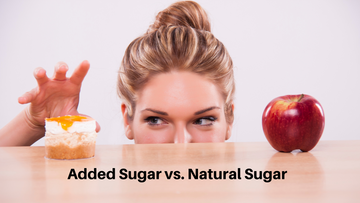In the quest for a healthier lifestyle, one of the most discussed topics is the role of sugar in our diet. Sugar, a staple in many of our food and drink items, comes in different forms with varied health implications. Two primary forms of sugar that often spark debate are natural sugars and added sugars. Understanding these two forms is vital to making more informed dietary choices that could have significant impacts on your health and well-being.
Natural sugars and added sugars might seem similar on the surface—both provide sweetness and energy. However, their origins, nutritional profiles, and effects on the body can differ substantially. While natural sugars are found inherently in foods like fruits and milk, added sugars are incorporated during processing to enhance flavor and shelf life. This blog will explore the intricate details of natural and added sugars, their pros and cons, and equip you with the knowledge to make better dietary decisions.
Also Read: How To Reduce Sugar Level Home Remedies: Natural Ways to Manage Blood Sugar
What Is Natural Sugar?
Natural sugars are those that occur naturally in whole foods such as fruits, vegetables, dairy products, and some grains. The most common natural sugars include fructose, found in fruits, and lactose, found in milk and dairy products. These sugars exist alongside essential nutrients, fibers, and minerals that play crucial roles in a balanced diet.
One of the key benefits of consuming natural sugars is their association with other vital nutrients that promote overall health. For instance, fruits are rich in vitamins, antioxidants, and fiber, which can aid digestion, boost immune function, and protect against various diseases. Similarly, dairy products provide calcium and vitamin D, essential for bone health. As a result, the body utilizes these sugars more efficiently, reducing the likelihood of negative health impacts.
What Is Added Sugar?
Added sugars are any sugars or caloric sweeteners that are added to foods or beverages during processing or preparation. Common examples include sucrose, high-fructose corn syrup, and various syrups added to sodas, candies, pastries, and numerous processed foods. These sugars serve to improve flavor, texture, and shelf life but provide little to no nutritional value.
Added sugars are often devoid of the beneficial nutrients found in whole foods. When consumed in excess, they contribute to numerous health issues, including obesity, heart disease, diabetes, and dental problems. Added sugars offer empty calories, meaning they provide energy without any of the essential nutrients your body needs. This lack of nutritional value makes added sugars particularly harmful when consumed regularly and in large quantities.
Also Read: The Life-Changing Benefits of Not Eating Sugar for a Healthier, Happier You
How Natural Sugar is Good For Your Health
Enhanced Nutrient Intake
Natural sugars come packaged with essential nutrients. For example, fruits deliver vitamins like C and A, antioxidants, and fiber—all crucial for maintaining immune function, skin health, and digestive health.
Steady Energy Levels
Natural sugars are often accompanied by fiber and protein, which slow down the absorption of sugar into the bloodstream. This results in steadier energy levels without the spikes and crashes that added sugars often cause.
Better Digestive Health
Foods with natural sugars, such as fruits and vegetables, are generally high in fiber. Fiber aids digestion by helping to regulate bowel movements and maintain gut health.
Improved Heart Health
Diets rich in fruits and vegetables have been associated with a reduced risk of heart disease. The natural sugars in these foods, combined with their fiber content, can help manage blood pressure and cholesterol levels.
How Added Sugar can Affect You
Increased Risk of Obesity
Added sugars contribute extra calories to the diet without adding essential nutrients. Consuming high amounts of added sugar leads to an excess of caloric intake, which can result in weight gain and obesity.
Greater Likelihood of Diabetes
Consistently high sugar consumption can lead to insulin resistance, a key factor in the development of type 2 diabetes. Added sugars, especially from sugary drinks, are strongly linked to this condition.
Poor Dental Health
Sugary foods and beverages are a leading cause of dental problems like cavities and tooth decay. Bacteria in the mouth feed on sugar, producing acids that damage tooth enamel.
Increased Risk of Heart Disease
Research has shown a connection between high added sugar consumption and an increased risk of heart disease. Added sugars can raise blood pressure, increase inflammation, and lead to the accumulation of harmful fat around the organs.
Also Read: Why is Sugar Harmful to Your Health and Well-being? Unveiling the Hidden Dangers
Comparison Between Natural Sugar and Added Sugar
Nutritional Content
Natural sugars come with essential nutrients such as vitamins, minerals, and fiber. Added sugars, however, offer no nutritional benefit and only provide empty calories.
Impact on Metabolism
Natural sugars, when consumed as part of whole foods, are metabolized more slowly due to the fiber and protein they accompany. In contrast, added sugars are quickly absorbed, causing rapid spikes in blood sugar levels.
Health Implications
Consuming natural sugars as part of a balanced diet is generally associated with health benefits, including better heart and digestive health. On the other hand, excessive intake of added sugars is linked to numerous health issues, such as obesity, diabetes, and heart disease.
Satiety and Overconsumption
Natural sugars tend to promote a feeling of fullness because of their fiber content, thus reducing the likelihood of overeating. Added sugars, however, do not promote satiety, leading to increased caloric consumption and weight gain.
Conclusion
Understanding the distinction between natural and added sugars is crucial for making informed dietary choices. While natural sugars nourish the body with essential nutrients and provide sustained energy, added sugars contribute largely to empty calories and numerous health risks. By choosing foods rich in natural sugars like fruits and vegetables and limiting those high in added sugars, you can significantly improve your dietary habits and overall health.
In conclusion, moderation and awareness are key. Emphasizing the intake of natural sugars while minimizing added sugars can lead to a healthier lifestyle. The choices we make concerning sugar consumption can have long-lasting effects, underscoring the importance of understanding what we put into our bodies. Making conscious decisions can pave the way for a healthier, more balanced life.












